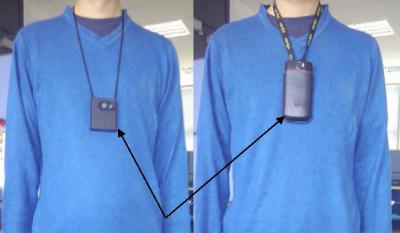Feb 7 2013
Understanding the relationships between lifestyle behaviors and health outcomes can be enhanced by the use of wearable cameras, concludes a collection of studies in a special theme issue of the American Journal of Preventive Medicine.
 Wearable cameras take first-person point-of-view images and are now helping health researchers better understand lifestyle behaviors (Credit: A.R. Doherty et al.)
Wearable cameras take first-person point-of-view images and are now helping health researchers better understand lifestyle behaviors (Credit: A.R. Doherty et al.)
Three studies report on the latest preventive medicine research using Microsoft's wearable camera, the SenseCam.
"Wearable cameras and their associated software analysis tools have developed to the point that they now appear well suited to measure sedentary behavior, active travel, and nutrition-related behaviors," says author Aiden R. Doherty, PhD, from the Department of Public Health at the University of Oxford, United Kingdom. "Individuals may recall events more accurately after reviewing images from their wearable cameras, and in addition aspects of their immediate cognitive functioning may also improve."
A paper titled "Using the SenseCam to Improve Classifications of Sedentary Behavior in Free-Living Settings," shows, for example, the advantages of wearable cameras over accelerometers in providing both type and context information about sedentary behavior. Jacqueline Kerr and colleagues found that while TV viewing, other screen use, and administrative activities were correctly classified by accelerometers, the standing postures are often misclassifýed as sedentary behavior. Additionally, a nearly 30-minute per day difference was found in sedentary behavior estimates based on the accelerometer versus the SenseCam.
A study by researchers in Ireland analyzes how wearable cameras were employed to improve the recording of dietary intake among jockeys, Gaelic footballers, and physically active college students. The researchers, led by Gillian O'Loughlin of Dublin City University, report that images from the SenseCam provide additional information regarding dietary intake patterns, such as portion size, forgotten foods, leftovers, and brand names. Using wearable cameras also revealed a significant under-reporting of calorie intake, which is a prevalent and critical error of food diaries and self-reporting. Adding wearable cameras to dietary analysis provides a valuable tool not only for athletes and sport populations who closely monitor calorie intake, but may also present dieticians and health providers with the ability to better assess and treat those in need of dietary management.
In a study titled "Benefits of SenseCam Review on Neuropsychological Test Performance," Ana R. Silva and colleagues highlight how wearable cameras can act as a cognitive stimulant in the short term. Compared to re-reading diary entries, Microsoft's SenseCam wearable camera was found to improve autobiographic memory by prompting events reflected in the images, underlining the possibilities for using SenseCam in memory rehabilitation. While future research is still needed, the researchers propose wearable cameras have the potential to reduce the resources required in treating neurodegenerative diseases, such as Alzheimer's.
Another study, "The Smartphone as a Platform for Wearable Cameras in Health Research," recognizes obstacles in the widespread adoption of Microsoft's SenseCam wearable camera, and thus presents smartphones as a viable, and in some cases, enhanced alternative.